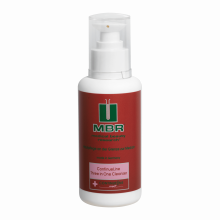Moisturizing
Why the Skin Needs Moisturizing
As part of its natural process, in a perfect world, the skin should be able to keep itself hydrated. In reality, however, irritants such as harsh cleansing products and excess exposure to environmental elements can upset the skin's natural balance. The conditions often remove the protective oil-based products in the skin, thereby decreasing the effectiveness of its barrier. Because water can then evaporate from the skin more easily, the result can be drier skin- hence, the need for moisturizers.
Like toning, there are disagreements among experts about the necessity of moisturizing. Most agree that it is a necessary component of a daily skincare routine, but others put forth the following arguments. First, they recommend moisturizing only for people with dry skin. If you have normal or oily skin, you naturally are producing enough (or too much) moisture for your skin. Additionally, most people are using advanced skincare products with active ingredients meant to reduce or prevent the signs of aging. These products generally contain moisturizing components as part of their ingredients, so it's not necessary to apply another product.
- If extenuating circumstances such as exposure to dry climate or frequent water exposure, people with normal skin may want to consider it part of their daily regimen.
- If you feel the need to moisturize, buy products that are oil-free or water-based. Moisturizers with oil in their ingredients tend to clog the pores of your skin.
- When applying, use upward and outward strokes.
Emulsions
Emulsion-based moisturizers have a mixture of oil-based products and water. As oil and water don't mix, additives referred to as surfactants are added to stabilize the mixture. In this way, the product won't separate. Depending on the water-to-oil ratio, emulsions can be referred to as oil-in-water or water-in-oil. To be deemed "water-based," the amount of water added to the mixture must be greater than the amount of oil-soluble substance added.
Emulsions are useful for skin that produces too little sebum and is therefore very dry. This situation is widespread in women during and after menopause. Oil-in-water emulsions are generally heavier than normal moisturizers and can benefit those with dehydrated skin. If you have normal or oily skin, you should not use these products.
Water-proof
Occlusive moisturizers may include petrolatum, mineral oil, and siloxanes among their ingredients- imagine a Vaseline-type of consistency. Occlusives cover the skin with a waterproof film through which water cannot evaporate or escape. Because occlusive moisturizers can clog pores and may produce other adverse side effects, they should only be employed for dry skin, unresponsive to oil-water emulsions.
For oily skin types
Humectants are made from substances that can trap and hold water. They are designed to attract water either from the environment or from the underlying dermis to the epidermis. Oil-free moisturizers are recommended for people who have normal to oily skin but still feel the need or desire to moisturize.
For dry skin types
Ordinary moisturizing lasts for about an hour or two before dissipating. However, if your skin is dehydrated or if you live in an arid environment, you may want to consider long-lasting moisturizers. They are generally a mix of both humectants, occlusive ingredients and should only be employed for severe dryness.



